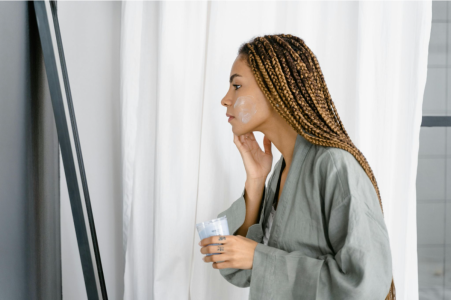Is your chin hair trying to tell you something? What every woman needs to know
By
Aubrey Razon
- Replies 1
Disclaimer: The information provided in this article is for educational purposes only and is not intended as a substitute for professional medical advice, diagnosis, or treatment. Always consult your physician or other qualified healthcare providers with any questions you may have regarding a medical condition or before making any changes to your health regimen.
Aging comes with its surprises, and chin hair is one many women face. While it's a common part of getting older, could it be more than just a cosmetic issue?
Here’s why those pesky whiskers might be trying to tell you something important.
For women, chin hair is a common occurrence, and it's usually nothing to worry about.
But as we delve deeper into the world of facial hair, it's important to distinguish between the two types of hair that grace our faces.
The soft, almost invisible peach fuzz that adorns our faces is known as vellus hair. It's the unassuming background player in the hair department.
Then there's terminal hair – the thicker, coarser, and darker strands that make up our eyebrows, eyelashes, and the hair on our heads. These are the hairs that often find themselves in the crosshairs of our tweezers.
Why does chin hair become more prominent with age?
The answer lies in androgens, a group of sex hormones that includes testosterone.
While testosterone is often associated with men, it plays a role in women's bodies too, contributing to bone density, muscle development, and the onset of puberty.
As we age, hormonal changes can cause an increase in androgens, leading to more noticeable chin hair.
This can be due to genetics, which determines how sensitive your hair follicles are to dihydrotestosterone (DHT), an androgen derived from testosterone.
If you're genetically predisposed to have more sensitive DHT receptors, even normal hormone levels can lead to increased facial hair growth.
Hirsutism, a condition characterized by excessive hair growth, can be a sign of several underlying conditions, affecting 5 to 10% of women of reproductive age.
Here are some potential causes:
1. Polycystic Ovary Syndrome (PCOS)
This hormonal disorder can lead to irregular ovulation, increased testosterone, and, consequently, more DHT. Symptoms also include acne, hair loss, weight gain, and insulin resistance.
2. Menopause
The hormonal shifts during perimenopause and menopause can lead to a decrease in estrogen and a relative increase in androgens, resulting in more chin hair.
3. Weight Fluctuations
Significant weight gain or loss can disrupt hormone levels. In extreme cases, such as with eating disorders, the body may produce lanugo, a soft, thin hair, to keep warm.
4. Cushing Syndrome
Overproduction of cortisol, the stress hormone, can lead to increased androgen production and excess hair growth.
5. Late-Onset Congenital Adrenal Hyperplasia
This condition affects the adrenal glands, leading to an excess of androgens and symptoms like a deeper voice and acne.
6. Medications:
Certain drugs, including anabolic steroids and minoxidil, can cause excessive hair growth.
7. Androgen-Secreting Tumor
Though rare, tumors in the adrenal glands or ovaries can lead to excess hair growth, a deeper voice, and acne.
If you're experiencing chin hair that's excessive or has appeared suddenly, it's wise to consult a healthcare professional.
Blood work and medical evaluations can help rule out conditions that may cause facial hair growth. Managing the underlying condition is key to addressing ongoing chin hair issues.
For those looking to manage their chin hair, there are both medical and aesthetic interventions.
Prescription creams, hormonal treatments, and permanent removal options like laser hair removal and electrolysis are available. It's important to choose the right treatment based on your hair type and color.
Ultimately, whether you choose to embrace your chin hair or seek out ways to reduce it is a personal decision.
There's nothing inherently wrong with women having chin hair; it's a natural part of aging for many.
But if your chin hair comes with other symptoms or concerns, don't hesitate to reach out for medical advice.
 Have you noticed changes in your hair growth patterns? What solutions have you found effective? Share your experiences and tips in the comments below.
Have you noticed changes in your hair growth patterns? What solutions have you found effective? Share your experiences and tips in the comments below.
Aging comes with its surprises, and chin hair is one many women face. While it's a common part of getting older, could it be more than just a cosmetic issue?
Here’s why those pesky whiskers might be trying to tell you something important.
Understanding the Whiskers: Normal Hair Growth vs. Health Indicators
The human body is a tapestry of hair, some of which we cherish and some we could do without.For women, chin hair is a common occurrence, and it's usually nothing to worry about.
But as we delve deeper into the world of facial hair, it's important to distinguish between the two types of hair that grace our faces.
The soft, almost invisible peach fuzz that adorns our faces is known as vellus hair. It's the unassuming background player in the hair department.
Then there's terminal hair – the thicker, coarser, and darker strands that make up our eyebrows, eyelashes, and the hair on our heads. These are the hairs that often find themselves in the crosshairs of our tweezers.
Why does chin hair become more prominent with age?
The answer lies in androgens, a group of sex hormones that includes testosterone.
While testosterone is often associated with men, it plays a role in women's bodies too, contributing to bone density, muscle development, and the onset of puberty.
As we age, hormonal changes can cause an increase in androgens, leading to more noticeable chin hair.
The Genetic and Hormonal Tango
Some women may notice that their chin hair is particularly unruly or fast-growing.This can be due to genetics, which determines how sensitive your hair follicles are to dihydrotestosterone (DHT), an androgen derived from testosterone.
If you're genetically predisposed to have more sensitive DHT receptors, even normal hormone levels can lead to increased facial hair growth.
When Chin Hair Raises a Red Flag
While chin hair is often harmless, there are times when it can be a symptom of a health issue.Hirsutism, a condition characterized by excessive hair growth, can be a sign of several underlying conditions, affecting 5 to 10% of women of reproductive age.
Here are some potential causes:
1. Polycystic Ovary Syndrome (PCOS)
This hormonal disorder can lead to irregular ovulation, increased testosterone, and, consequently, more DHT. Symptoms also include acne, hair loss, weight gain, and insulin resistance.
2. Menopause
The hormonal shifts during perimenopause and menopause can lead to a decrease in estrogen and a relative increase in androgens, resulting in more chin hair.
3. Weight Fluctuations
Significant weight gain or loss can disrupt hormone levels. In extreme cases, such as with eating disorders, the body may produce lanugo, a soft, thin hair, to keep warm.
4. Cushing Syndrome
Overproduction of cortisol, the stress hormone, can lead to increased androgen production and excess hair growth.
5. Late-Onset Congenital Adrenal Hyperplasia
This condition affects the adrenal glands, leading to an excess of androgens and symptoms like a deeper voice and acne.
6. Medications:
Certain drugs, including anabolic steroids and minoxidil, can cause excessive hair growth.
7. Androgen-Secreting Tumor
Though rare, tumors in the adrenal glands or ovaries can lead to excess hair growth, a deeper voice, and acne.
If you're experiencing chin hair that's excessive or has appeared suddenly, it's wise to consult a healthcare professional.
Blood work and medical evaluations can help rule out conditions that may cause facial hair growth. Managing the underlying condition is key to addressing ongoing chin hair issues.
For those looking to manage their chin hair, there are both medical and aesthetic interventions.
Prescription creams, hormonal treatments, and permanent removal options like laser hair removal and electrolysis are available. It's important to choose the right treatment based on your hair type and color.
Ultimately, whether you choose to embrace your chin hair or seek out ways to reduce it is a personal decision.
There's nothing inherently wrong with women having chin hair; it's a natural part of aging for many.
But if your chin hair comes with other symptoms or concerns, don't hesitate to reach out for medical advice.
Key Takeaways
- Chin hair is common among women and can become more noticeable and coarser with age due to hormonal changes.
- Conditions such as polycystic ovary syndrome (PCOS) and menopause can lead to increased chin hair due to hormonal imbalances.
- Significant weight changes and certain medications can also affect hair growth, and rare conditions like androgen-secreting tumours may cause excess hair.
- There are various treatments for managing chin hair, from medical interventions like prescription creams and hormonal treatments, to cosmetic procedures such as laser hair removal and electrolysis.








